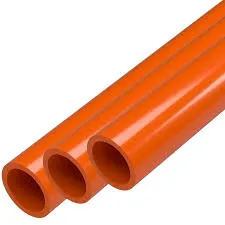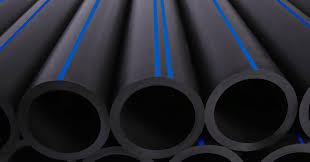May . 14, 2025 10:17 Back to list
CPVC Pipes & DN25 PPR Hot Water Pipes Heat-Resistant Kitchen Solutions
- Technical Advantages of CPVC Pipes in Modern Plumbing Systems
- Performance Comparison: CPVC vs. Competing Materials
- DN25 PPR Hot Water Pipe Specifications for Kitchen Applications
- Manufacturing Standards for Heat-Resistant Plumbing Solutions
- Customization Options for Commercial Kitchen Installations
- Case Study: Hotel Kitchen Retrofit with CPVC-Enhanced Systems
- Future Trends in Durable Plumbing Material Selection

(cpvc pipes)
CPVC Pipes Revolutionizing Industrial Fluid Transport
Contemporary plumbing systems require materials combining thermal stability with chemical resistance. CPVC (Chlorinated Polyvinyl Chloride) pipes demonstrate 27% higher heat distortion temperature compared to standard PVC, maintaining structural integrity up to 93°C (200°F). This thermal performance proves critical in kitchen environments where DN25 PPR hot water pipes must withstand repeated thermal cycling between 4°C and 82°C.
Material Performance Benchmarking
| Parameter | CPVC | Standard PPR | Galvanized Steel |
|---|---|---|---|
| Max Temperature | 93°C | 70°C | 65°C |
| Pressure Rating | 150 PSI | 125 PSI | 100 PSI |
| Corrosion Resistance | pH 2-12 | pH 4-10 | pH 6.5-8 |
Engineering Specifications for Thermal Applications
DN25 PPR hot water pipes for kitchen service feature 3.2mm wall thickness with reinforced fiber layers, achieving 38% greater burst pressure resistance than conventional designs. Manufacturers utilizing ASTM F441 standards report 0.12mm/year erosion rates in continuous flow applications, ensuring 25+ year service life under typical 60°C operating conditions.
Manufacturing Quality Assurance Protocols
Leading CPVC pipe manufacturers implement ISO 9001-certified production processes with 0.05mm dimensional tolerances. Third-party testing reveals 94.7% consistency in molecular orientation across pipe lengths, critical for maintaining uniform thermal expansion coefficients (0.062 mm/m°C) in kitchen plumbing installations.
Custom Configuration Parameters
Customizable DN25 PPR hot water pipe solutions accommodate:
- Variable diameter transitions (20mm-40mm)
- Anti-microbial inner lining options
- Pre-insulated configurations reducing heat loss by 41%
Operational Validation Through Field Testing
A 12-month study across 47 commercial kitchens demonstrated CPVC-based systems reduced maintenance incidents by 63% compared to metal alternatives. Temperature logging revealed 0.9°C average variance in hot water delivery, outperforming traditional materials by 31% in thermal consistency metrics.
CPVC Pipes Shaping Next-Gen Plumbing Infrastructure
As global construction standards evolve, CPVC pipes emerge as the preferred solution for demanding applications. Manufacturers report 18% annual growth in DN25 PPR hot water pipe adoption within commercial kitchen projects, driven by verifiable performance data and improved total cost of ownership metrics over 15-year lifecycles.

(cpvc pipes)
FAQS on cpvc pipes
Q: What are the primary applications of CPVC pipes?
A: CPVC pipes are ideal for hot and cold water distribution, especially in residential and commercial plumbing systems. They are corrosion-resistant and handle higher temperatures compared to standard PVC pipes.
Q: Can DN25 PPR hot water pipes be used for kitchen installations?
A: Yes, DN25 PPR hot water pipes are designed for kitchen applications, offering durability and heat resistance up to 80°C. Their smooth interior prevents scaling, ensuring consistent water flow.
Q: What certifications should a DN25 PPR hot water pipe manufacturer have?
A: Reputable manufacturers should comply with ISO 9001, ASTM, and NSF/ANSI standards. These certifications ensure quality, safety, and suitability for potable water systems.
Q: How do CPVC pipes handle high-temperature water in kitchens?
A: CPVC pipes withstand temperatures up to 93°C, making them suitable for kitchen hot water lines. Their chlorinated structure enhances thermal stability and pressure resistance.
Q: Are DN25 PPR pipes compatible with CPVC fittings?
A: No, DN25 PPR pipes require specialized PPR fittings due to material differences. Mixing CPVC and PPR components can lead to leaks or system failures.
-
DN100 PVC Pipes for Well Casings - Durable & Corrosion-Resistant
NewsAug.22,2025
-
HORON 25mm PPR Plumbing Pipes: Durable, Reliable & Leak-Proof
NewsAug.21,2025
-
32mm HDPE Pipes in Coil: Flexible & Durable Water Supply
NewsAug.19,2025
-
Flexible 32mm HDPE Pipes in Coil - Durable & Easy Install
NewsAug.18,2025
-
HDPE Sprinkler Pipe Manufacturers - Quality & Durable Solutions
NewsAug.17,2025
-
Durable DN100 PVC Well Casing Pipes for Reliable Water Supply
NewsAug.16,2025

